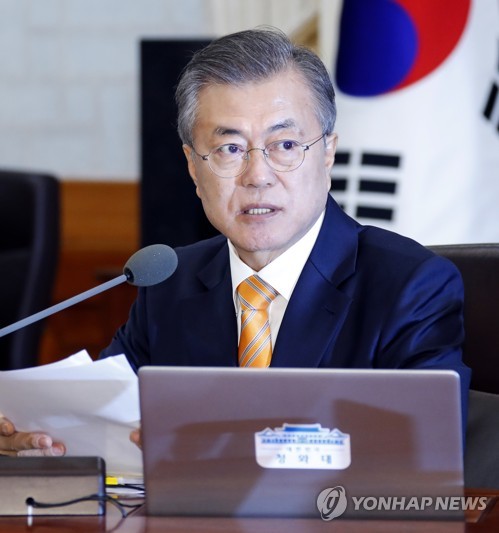- California Assembly OKs highest minimum wage in nation
- S. Korea unveils first graphic cigarette warnings
- US joins with South Korea, Japan in bid to deter North Korea
- LPGA golfer Chun In-gee finally back in action
- S. Korea won’t be top seed in final World Cup qualification round
- US men’s soccer misses 2nd straight Olympics
- US back on track in qualifying with 4-0 win over Guatemala
- High-intensity workout injuries spawn cottage industry
- CDC expands range of Zika mosquitoes into parts of Northeast
- Who knew? ‘The Walking Dead’ is helping families connect
Moon ratifies summit agreement amid opposition parties’ protest
SEOUL, Oct. 23 (Yonhap) — President Moon Jae-in ratified last month’s summit agreement with North Korean leader Kim Jong-un, as conservative opposition parties cried foul and accused him of failing to seek parliamentary consent.
The government decided to ratify the Pyongyang Joint Declaration on its own as the Ministry of Government Legislation concluded that parliamentary consent is not necessary because an earlier, overarching agreement, the Panmunjom Declaration reached at April’s first summit between Moon and Kim, is going through a parliamentary ratification process.
The ministry’s point was that last month’s Pyongyang Declaration is designed to carry out April’s Panmunjom Declaration, and parliamentary ratification of the broader agreement would cover all subsidiary agreements.
“Improvement in inter-Korean relations and reduction in military tensions will make it easier and facilitate complete denuclearization of the Korean Peninsula,” Moon said during a Cabinet meeting where the summit agreement and a separate inter-Korean military agreement were approved for ratification.
“It is not only a way to protect the lives of our people and promote their safety, but it will also be helpful to our economy by removing crisis factors,” he said. “More than anything else, it will be beneficial to people living near the border, and it is also a way to substantially improve the human rights of North Korean people.”
April’s Panmunjom Declaration contains a series of broad agreements to halt “all hostile acts” against each other, explore ways to enhance cross-border exchanges and pursue the complete denuclearization of the Korean Peninsula.
The Pyongyang Joint Declaration fleshed out the April deal and calls for a series of wide-ranging economic and humanitarian cooperation projects and exchanges between the two sides. It also contains the North’s commitment to take specific steps toward denuclearization.
The military agreement calls for ceasing all hostile acts against each other so as to reduce military tensions and prevent accidental clashes, such as suspending all military exercises near the land and sea borders between the two sides.
The main opposition Liberty Korea Party protested the government failed to win parliamentary consent.
“The (Moon Jae-in) government claims that the Panmunjom Declaration needs parliamentary ratification, but there is no need to ratify the Pyongyang summit and military agreements, key elements (of the April deal). This perception shows how the president is dogmatic,” Kim Sung-tae, the floor leader of the LKP, said.
“The government is calling on opposition parties to cooperate, but in reality, it ignores people and the National Assembly,” he added.
The minor opposition Bareunmirae Party raised the issue of procedural legitimacy.
“It is problematic that the Cabinet approved the Pyongyang deal first just because the president could not sign the April summit agreement pending on the parliament,” Kim Kwan-young, the floor leader of the BP, said. “It should have watched the National Assembly’s discussion on the April deal further.”
But the ruling Democratic Party defended the ratification.
“It is not an issue of whether the Pyongyang summit deal should be approved prior to or after the ratification of the Panmunjom Declaration,” the ruling party said. “The approval also indicates the need for the National Assembly to ratify the April summit deal. We hope that the political circle will cooperate with the ratification to help improve inter-Korean ties.”
The government has submitted a motion asking for parliamentary ratification of the April agreement. But opposition parties have been negative about the request, claiming there is no exact cost estimate necessary to carry out the agreement.












